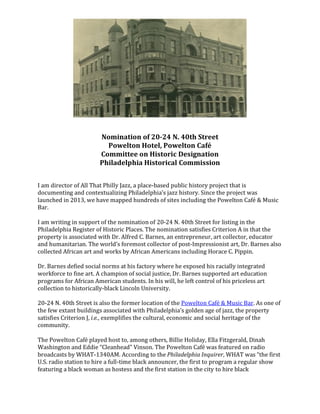
Powelton Cafe & Music Bar
- 1. Nomination of 20-24 N. 40th Street Powelton Hotel, Powelton Café Committee on Historic Designation Philadelphia Historical Commission I am director of All That Philly Jazz, a place-based public history project that is documenting and contextualizing Philadelphia’s jazz history. Since the project was launched in 2013, we have mapped hundreds of sites including the Powelton Café & Music Bar. I am writing in support of the nomination of 20-24 N. 40th Street for listing in the Philadelphia Register of Historic Places. The nomination satisfies Criterion A in that the property is associated with Dr. Alfred C. Barnes, an entrepreneur, art collector, educator and humanitarian. The world’s foremost collector of post-Impressionist art, Dr. Barnes also collected African art and works by African Americans including Horace C. Pippin. Dr. Barnes defied social norms at his factory where he exposed his racially integrated workforce to fine art. A champion of social justice, Dr. Barnes supported art education programs for African American students. In his will, he left control of his priceless art collection to historically-black Lincoln University. 20-24 N. 40th Street is also the former location of the Powelton Café & Music Bar. As one of the few extant buildings associated with Philadelphia’s golden age of jazz, the property satisfies Criterion J, i.e., exemplifies the cultural, economic and social heritage of the community. The Powelton Café played host to, among others, Billie Holiday, Ella Fitzgerald, Dinah Washington and Eddie “Cleanhead” Vinson. The Powelton Café was featured on radio broadcasts by WHAT-1340AM. According to the Philadelphia Inquirer, WHAT was “the first U.S. radio station to hire a full-time black announcer, the first to program a regular show featuring a black woman as hostess and the first station in the city to hire black
- 2. newscasters. It also was the first in the nation to feature a black as host of a daily talk show.” In his book, Fashion and Jazz: Dress, Identity and Subcultural Improvisation, Drexel University Prof. Alphonso McClendon wrote: The influence of Harlem and the legendary Cotton Club with its extravagant floor shows of light-skinned chorus girls are noted in the previous descriptions, as well as the naming of the Ridge Cotton Club along the Ridge Avenue entertainment district. In addition, the ubiquitous title of café … implied inspiration from Europe and the desire to accentuate superior social mingling [emphasis added]. The Powelton Café was one of dozens of nightclubs that existed over the course of Philadelphia’s jazz heyday (roughly 1930s to 1960s). Professor McClendon observed: In sum, the African American music landscape signified a workshop of cultural aesthetics that thrived socially outside of the white mainstream culture, yet geographically inside. This entertainment imprint through the branding of bars, cafés and theaters demonstrated vicissitudes in the setting, style, structure, depiction and patronage of the music. Indeed, this unique period of ragtime, blues, swing and bebop was, as scripted by Irene’s Café, “filled with scenes of happy men and women.” Live music, fashion, social hierarchy and jazz vernacular pulsed in Philadelphia. The significance of these venues is that they provided a space where people accessed joy and experienced sophistication, equally responding to the racial environment and transforming neighborhood culture. A history of Philadelphia is incomplete without the narrative of these establishments. 20-24 N. 40th Street meets the criteria for designation. Accordingly, the Committee on Historic Designation should recommend the property for listing in the Philadelphia Register of Historic Places. Respectfully submitted, Faye M. Anderson Faye M. Anderson Director All That Philly Jazz www.phillyjazz.us (267) 282-1342 phillyjazzapp@gmail.com
